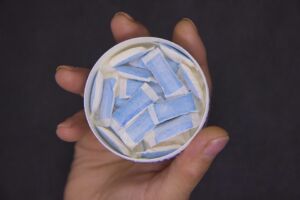News
Smoke-free nicotine products soaring in popularity among Danish youths
This article is more than 2 years old.
Nicotine pouches and vaped disposable e-cigarettes tend to be the most popular choices among teens

Nicotine pouches are increasingly popular (photo: StingFree/Pixabay)
Some 35.1 percent of young people aged 15-29 use nicotine products on a daily or occasional basis, according to ‘§RØG’, a report compiled by the University of Southern Denmark for Statens Institut for Folkesundhed – a significant jump from 2020, when the figure was 26.3 per cent.
While tobacco-based products are less popular, falling from 20.1 to 19 percent of the age group – despite a rise in the share of 15 to 17-year-olds from 11.9 to 13.7 percent – the use of smoke-free options is quickly increasing in popularity, rising from 9.1 to 12.9 percent.
The most popular choices are nicotine pouches, typically taken under the upper lip and sucked on, and vaped disposable e-cigarettes – puff bars, which look like USB sticks, are popular choices.
Designed to target teenagers
The smoke-free products particularly target teenagers. They tend to taste citrusy/fruity and be sold with eye-catching packaging, but without the warnings carried by tobacco products.
“Nicotine products have caught on well with young people: boys like snus-like products, while e-cigarettes are popular with both boys and girls,” Professor Charlotta Pisinger, an expert on tobacco prevention at the University of Copenhagen, told TV2.
Pisinger is concerned the products are becoming teenagers’ first introduction to nicotine, which is highly addictive, she warns, and can “damage the immature brain”, potentially causing anxiety, attention disorders and depression
“Many young people who start using snus would probably never have become smokers. After all, we have not seen a corresponding decrease in the proportion of young Danish smokers, as snus has gained ground,” she reasoned.
Heart association urges higher prices and more restrictions
Certainly, more warnings need to be carried by the nicotine products, according to Mads Lind, the chief consultant at Hjerteforeningen, who advocates a number of measures, including raising the price.
“We have seen with tobacco products that the price has had an impact on consumption,” he told TV2.
“Nicotine pouches should be more closely equated with tobacco products, so that they are, for example, subject to a flavour ban, and then there should be colour-neutral packages for the product.”
The Nikotinbrancheforeningen interest group rejects the recommendations, arguing that the law prohibiting sales to under-18s simply needs to be enforced.
“If you increase the tax and make it as expensive as smoking, then there is less incentive to stop using tobacco products,” the group’s head, Inger Schroll-Fleischer, further argued.
READ MORE: Fewer young people smoke – but more use other tobacco and nicotine products










































